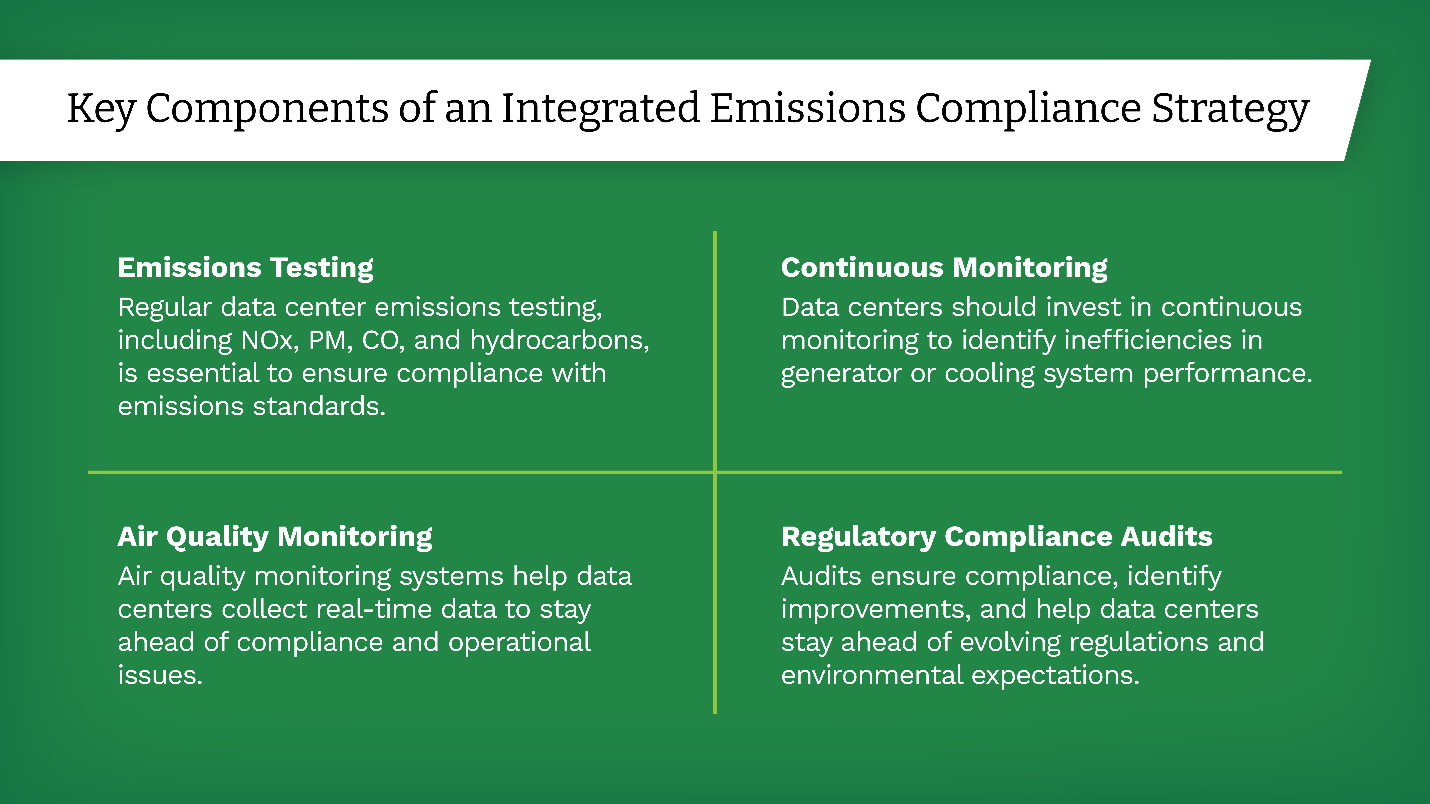
Future-Proofing Data Centers: Strategies for Emission Compliance and Sustainability
December 18, 2024
By: Shaun Gilday, CPEA, PMP and Kristina Schafer
Data centers have become the backbone of modern infrastructure, supporting everything from cloud storage to global communications. However, their reliance on energy-intensive systems, particularly diesel generators and cooling mechanisms, presents unique environmental challenges. Alongside high electricity demands, data centers also require vast amounts of water for cooling, which indirectly increases energy consumption as additional resources are needed to transport, process, and cool water supplies. These interlinked energy and water needs raise further sustainability concerns. With growing regulatory scrutiny around emissions, data centers must adopt a robust and integrated approach to meet environmental compliance while maintaining operational efficiency.
This blog explores the importance of emissions testing, EHS consulting, and compliance management for data centers, offering insights into best practices for navigating these challenges.
Why Emissions Compliance is Critical for Data Centers
To ensure seamless operations during power outages, data centers frequently use backup diesel generators, which can emit harmful pollutants such as Nitrogen Oxides (NOx), Particulate Matter (PM), and Carbon Monoxide (CO). As environmental regulations around air quality and emissions tighten, data centers must proactively monitor and mitigate these emissions to comply with federal, state, and local regulations like the Clean Air Act (CAA).
Non-compliance can result in financial penalties, reputational damage, and operational disruptions. Adopting a compliance-first mindset can offer significant operational benefits, including cost savings through optimized generator performance and reduced emissions.
Key Components of an Integrated Emissions Compliance Strategy
Achieving environmental compliance in data centers requires more than just periodic testing—it demands a holistic, integrated strategy. Some of the key components include:

Regulatory Consulting for Data Centers
Each data center presents unique challenges based on its size, location, and energy demands. A customized Environmental Health & Safety (EHS) strategy not only ensures compliance with local, state, and federal standards but also addresses specific operational needs. For example, data centers in the Pacific Northwest may need to focus on testing for Polycyclic Aromatic Hydrocarbons (PAHs) due to state-specific regulations, while those in California might face stricter emissions limits.
By partnering with experienced EHS consultants, data centers can develop comprehensive management systems that integrate environmental protection with workplace safety. Montrose offers customized solutions like regulatory compliance audits, which involve rigorous site assessments, document reviews, and interviews with key personnel to evaluate compliance with legal and industry standards. Our EHS management systems are designed under international frameworks such as ISO 14001, ISO 45000, and ISO 50000, addressing sector-specific challenges while promoting long-term operational resilience and environmental stewardship.
Additionally, Montrose helps data centers create and implement Spill Prevention Control and Countermeasure (SPCC) Plans. With large amounts of oil storage at risk, our approach includes prevention measures to stop spills, control measures to contain them, and countermeasure strategies for cleanup. When coupled with emergency action plans, these SPCC plans help prevent business-impacting accidents, enhancing both safety and compliance for data centers.
Sustainability and Operational Efficiency: A Dual Approach
Ensuring emissions compliance is about more than just meeting regulatory standards—it’s also about promoting sustainability and operational efficiency. Data centers that implement proactive generator testing, real-time air quality monitoring, and environmental audits can significantly reduce their carbon footprint and improve performance.
Best practices in this area include:
- Proactive Generator Testing: Regular testing helps to reduce emissions, improve performance, and minimize the risk of equipment failure.
- Continuous Air Quality Monitoring: Real-time monitoring allows data centers to address air quality issues before they impact compliance or operations.
- Integrated EHS Management Systems: These systems ensure that compliance is seamlessly integrated into daily operations, promoting long-term sustainability.
The Future of Data Center Environmental Compliance
As regulatory frameworks continue to evolve and pressure mounts for businesses to adopt greener practices, data centers must stay ahead of the curve. By integrating emissions testing, EHS consulting, and compliance management into their operations, data centers can ensure both regulatory compliance and long-term sustainability.
This integrated approach not only helps data centers reduce their environmental impact, but it also future-proofs their operations in a highly regulated and environmentally conscious world.
Data centers should view emissions compliance not as an isolated challenge but as part of a larger strategy for operational excellence and environmental stewardship.
Ready to take the next step? Contact Montrose Environmental today to learn how our comprehensive services can help your data center meet environmental regulations, improve sustainability, and stay ahead of compliance requirements. Let us partner with you to protect your operations and the environment.
 Shaun Gilday, CPEA, PMP
Shaun Gilday, CPEA, PMP
EHSS Auditing and Management Systems Operations Manager
Mr. Gilday is a senior EHS principal at Montrose with over 19 years of EHS auditing and compliance experience. Mr. Gilday has served as audit program manager for a number of large multi-media audit engagements as well as lead auditor for national and international audits across the oil and gas, chemical, and industrial manufacturing space and for a number of railroad operators and food and beverage clients. Mr. Gilday has broad multi-media experience and expertise in regulatory interpretations and EHS Program Development. Mr. Gilday has designed and established audit EHS programs and management systems for several fortune clients.
 Kristina Schafer
Kristina Schafer
PNW District Hub Manager
Kristina Schafer is the Pacific Northwest Hub District Manager for Montrose Air Quality, bringing over 13 years of experience in stack testing across the Pacific Northwest and Alaska. Her expertise spans equipment preparation, testing, site and project planning, reporting, and coordination. A dedicated professional in environmental compliance, Kristina’s innovative approach to air pollution control and waste management earned her the prestigious Hard Hat Award, recognizing her contributions to advancing the field through creative solutions.

